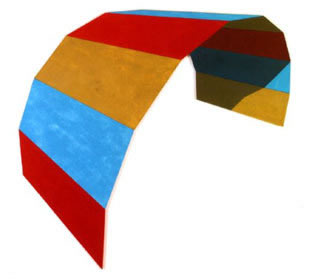

Wax
Series:
1995-1996
A
review by Christine Hemp
for THE Magazine, March 1998
Santa Fe, New Mexico
![]() Geometry
101 must have been a breeze for Ron Davis. His fascination with geometric
shapes has sustained his career since the '60s. Cool corners and intersecting
points are his trademark and they're stamped firmly into the current
paintings on wood at Jaquelin Loyd, the new cutting-edge gallery in
Taos.
Geometry
101 must have been a breeze for Ron Davis. His fascination with geometric
shapes has sustained his career since the '60s. Cool corners and intersecting
points are his trademark and they're stamped firmly into the current
paintings on wood at Jaquelin Loyd, the new cutting-edge gallery in
Taos.
![]() A
first impression leaves the viewer wondering when Davis will depart from
his old obsession (can't he move beyond the triangles?), but a closer
look reveals subtle change: Davis has ventured into the world of encaustic
surfaces, as if in his sixth decade he's moving toward softness—like
aging skin. I surreptitiously smoothed my palm over the surface planes
of The Wave and felt the thick red, mauve, wheat, and deep Mediterranean
blues. He applies encaustic wax and pigment to the wood, then arranges
the puzzle parts, fooling the viewer into seeing the finished pieces
as three- rather than two-dimensional. Spool, for example, is
made from about 15 pieces, each part shaded and colored in gradation
to suggest curves. The "icing" makes you swear they'd taste
like lime, mango, or grape (I didn't try that one).
A
first impression leaves the viewer wondering when Davis will depart from
his old obsession (can't he move beyond the triangles?), but a closer
look reveals subtle change: Davis has ventured into the world of encaustic
surfaces, as if in his sixth decade he's moving toward softness—like
aging skin. I surreptitiously smoothed my palm over the surface planes
of The Wave and felt the thick red, mauve, wheat, and deep Mediterranean
blues. He applies encaustic wax and pigment to the wood, then arranges
the puzzle parts, fooling the viewer into seeing the finished pieces
as three- rather than two-dimensional. Spool, for example, is
made from about 15 pieces, each part shaded and colored in gradation
to suggest curves. The "icing" makes you swear they'd taste
like lime, mango, or grape (I didn't try that one).
![]() I
prefer, however, the pieces which hint at movement: arches and bridges.
In Four Part
I
prefer, however, the pieces which hint at movement: arches and bridges.
In Four Part
Bridge,
Encaustic Arch, and Five Panel
Frame, multicolored
sections of wood look as if they buckle and curve like Chinese toys.
They give the illusion of spanning empty space, not surprising from
an artist who lives on the lip of the Rio Grande Gorge. Davis's interest
in structural shapes spills over into his own living quarters where
he has built studio dwellings based upon the Navajo hogan. His work
at Jaquelin Loyd reflects such architectural precision—no ragged
edges. Some pieces are also like lessons in perspective. Two Color
Block One consists of one olive and one magenta piece configured
to appear as a block though they are flat. The olive section acts as
the shaded side. The track lighting throws a real-life shadow behind
the piece, too, creating another layer of depth.
![]() After
seeing this show, I was thirsty for something more than shape and precision.
The paintings are stark, without emotion. Yet to see Davis's mind in
motion is to see what his art is about: He possesses the cool ideals
of mathematics, and he works from the assumption that the world is a
structured and balanced place, its forms constant.
After
seeing this show, I was thirsty for something more than shape and precision.
The paintings are stark, without emotion. Yet to see Davis's mind in
motion is to see what his art is about: He possesses the cool ideals
of mathematics, and he works from the assumption that the world is a
structured and balanced place, its forms constant.
Wax Series: 1995-1996
at Jaquelin Loyd Gallery